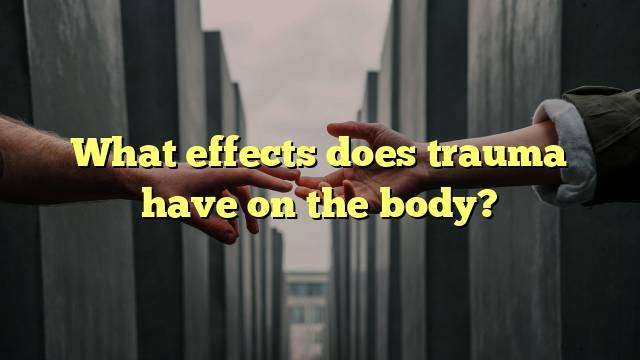The Effects of Trauma on the Body
Trauma is a deeply distressing experience that can have lasting effects on the body and mind. When a person is exposed to a traumatic incident, the body’s natural response is to become overwhelmed with fear and anxiety, triggering a state of fight-or-flight. During this time, the body becomes flooded with hormones that prepare it for a reaction. Unfortunately, this response can have long-term effects on the body if the trauma is not addressed and dealt with.
Physical Effects of Trauma
The physical effects of trauma can be both immediate and long-term. In the moments following a traumatic event, a person’s body may experience a range of reactions including:
- Exhaustion: Trauma can take a tremendous toll on the body, leaving a person feeling fatigued and drained.
- Confusion: The physical and emotional stress of a traumatic event can lead to confusion and disorientation.
- Sadness: Trauma can lead to feelings of sadness, grief, and depression.
- Anxiety: Trauma can cause a person to feel anxious, jumpy, and on edge.
- Agitation: Trauma can cause a person to become easily agitated and irritable.
- Numbness: Trauma can lead to a feeling of numbness and disconnection from the world around them.
- Dissociation: Trauma can cause a person to feel disconnected from their body and from reality.
- Physical Arousal: Trauma can lead to a heightened state of physical arousal, such as increased heart rate and sweating.
- Blunted Affect: Trauma can lead to a blunted emotional response and difficulty feeling pleasure or joy.
Most of these reactions are normal and are a natural response to a traumatic event. However, if these reactions persist over time, or if they become disruptive to a person’s life, it is important to seek professional help.
Long-Term Effects of Trauma
Trauma can have long-term effects on the body and mind, even years after the traumatic event has occurred. Some of the long-term effects of trauma can include:
- Chronic Pain: Trauma can cause chronic physical pain such as headaches, stomach aches, and back pain that can last for months or even years.
- Insomnia: Trauma can cause disrupted sleep patterns, making it difficult to fall asleep or stay asleep.
- Depression: Trauma can cause long-term depression, including feelings of sadness, hopelessness, and worthlessness.
- Anxiety: Trauma can lead to chronic anxiety and panic attacks, which can be disruptive to everyday life.
- Addiction: Trauma can lead to substance abuse and other forms of addiction, as a way of coping with the pain and distress of the traumatic event.
- Post-Traumatic Stress Disorder: Trauma can lead to Post-Traumatic Stress Disorder (PTSD), a disorder characterized by intrusive memories, flashbacks, nightmares, and avoidance of anything that might trigger memories of the traumatic event.
It is important to remember that these long-term effects of trauma are not inevitable, and they can be prevented with proper treatment and support. If you are struggling with the physical and emotional effects of trauma, it is important to seek professional help.
Treatment for Trauma
Treatment for trauma can vary depending on the individual and the nature of the traumatic event. Common treatments for trauma include:
- Cognitive-Behavioral Therapy (CBT): CBT is a form of therapy that focuses on changing negative thoughts and behaviors to promote better mental health.
- Exposure Therapy: Exposure therapy is a form of therapy that helps a person confront and process their traumatic memories in a safe and supportive environment.
- Eye Movement Desensitization and Reprocessing (EMDR): EMDR is a form of therapy that helps a person to process and heal from their traumatic experiences.
- Medication: Medication can help to reduce symptoms of anxiety, depression, and insomnia, allowing a person to better cope with their trauma.
- Support Groups: Support groups are a great way to connect with others who have gone through similar experiences and to gain support and understanding.
It is important to remember that there is no “one size fits all” approach to treating trauma, and it is important to find a treatment plan that works for you.
Conclusion
Trauma can have profound physical and psychological effects on the body. In the moments following a traumatic event, the body may experience a range of reactions including exhaustion, confusion, sadness, anxiety, agitation, numbness, dissociation, physical arousal, and blunted affect. Long-term effects of trauma can include chronic pain, insomnia, depression, anxiety, addiction, and Post-Traumatic Stress Disorder. Treatment for trauma can include cognitive-behavioral therapy, exposure therapy, eye movement desensitization and reprocessing, medication, and support groups. If you are struggling with the effects of trauma, it is important to seek professional help.
